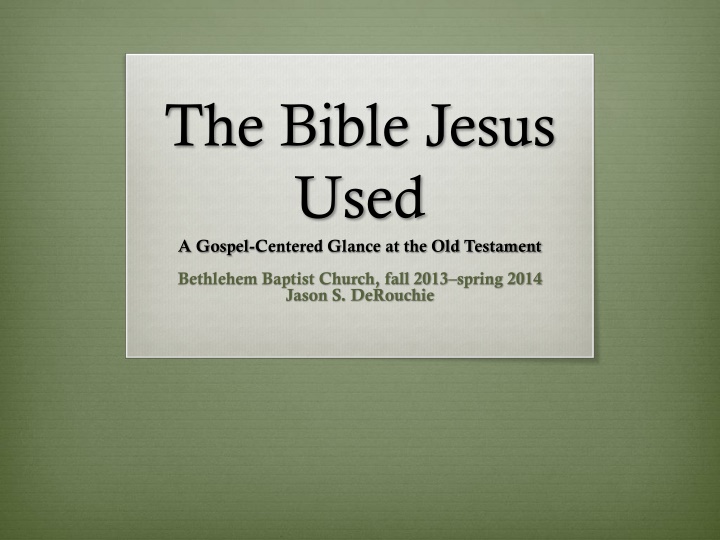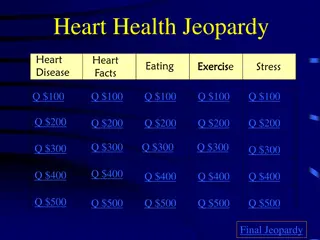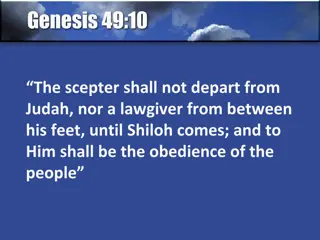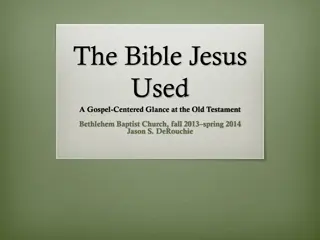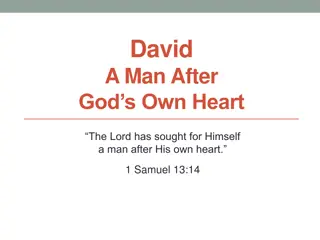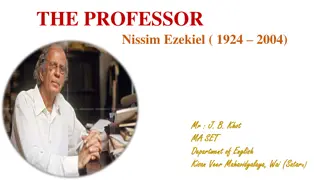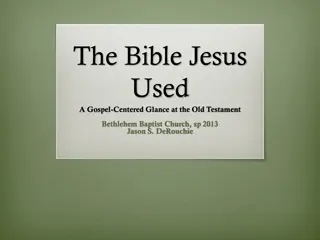The Departure of Judah's Heart from God in Ezekiel
Sustained sins of Judah lead to the departure of Yahweh's presence in Jerusalem, symbolizing the distance of Judah's heart from God. Various sins, including shedding innocent blood, idolatry, contempt for parents, exploitation of the vulnerable, and immorality, result in Judah's destruction or exile. Ezekiel portrays Judah's rebellion and judgment, culminating in a prophecy of Jerusalem's siege and a warning about failing to recognize their loss of God's presence due to hardened hearts.
Download Presentation

Please find below an Image/Link to download the presentation.
The content on the website is provided AS IS for your information and personal use only. It may not be sold, licensed, or shared on other websites without obtaining consent from the author.If you encounter any issues during the download, it is possible that the publisher has removed the file from their server.
You are allowed to download the files provided on this website for personal or commercial use, subject to the condition that they are used lawfully. All files are the property of their respective owners.
The content on the website is provided AS IS for your information and personal use only. It may not be sold, licensed, or shared on other websites without obtaining consent from the author.
E N D
Presentation Transcript
The Bible Jesus Used A Gospel-Centered Glance at the Old Testament Bethlehem Baptist Church, fall 2013 spring 2014 Jason S. DeRouchie
Jewish Settlement in the Babyonian Empire 2
Ezekiel at a Glance Ezekiel s Vision and Call Judgment against Judah Judgment against the Nations Hope for Israel and Judah Ezek 1 3 Chs. 4 24 Chs. 25 32 Chs. 33 48
Review The sustained sins of Judah result in the departure of Yahweh s presence from Jerusalem (chs. 8 11)
The departure of the presence symbolizes the distance of Judah s heart from God. Their sins: Innocent blood is shed by the powerful (22:3 4, 6) Idolatry (22:3 4) Contempt for parents (22:7) The sojourner, fatherless, and widow are wronged and exploited (22:7) What is holy is despised (22:8) Sexual immorality (22:10 11) Extortion and dishonest gain (22:12 13) The evidence of hardness: failure to grieve (9:4)
Judahs sin secures their destruction and/or exile (11:8 12) This rebellion and judgment is depicted in various ways in chs. 12 24 (e.g., the wayward bride, ch. 16; the covenant rebel, ch. 20), climaxing with a prophecy of Jerusalem s siege in ch. 24. The sign of Ezekiel in ch. 24: Losing the delight of your eyes (24:15 18) The messenger becomes the message: Don t mourn (24:16 17) in order to depict the foolishness of the people who fail to recognize the gravity of their loss of God s presence due to the hardness of their hearts.
Ezekiel leaves his audience with Jerusalem s siege imminent, their spiritual state described, and their future glim. He then enters into a series of foreign nation judgments, highlighting that Judah s end is no better than the nations. Ammon, Moab, Seir, Edom, Philistia (ch. 25), Tyre and Sidon (chs. 26 28), Egypt (chs. 29 32) Finally, Jersualem is destroyed (ch. 33)
The conclusion: Judah is dead a spiritual reality that the physical judgment/exile would portray! They are not resting in peace but lying under the curse of God; like a valley of dry bones (Ezek 37:1 2). Eph 2:1 3. And you were dead in the trespasses and sins 2 in which you once walked, following the course of this world, following the prince of the power of the air, the spirit that is now at work in the sons of disobedience . . . 3 by nature children of wrath.
The conclusion: Judah is dead a spiritual reality that the physical judgment/exile would portray! Any hope that follows is unmerited mercy and must be akin to resurrection.
